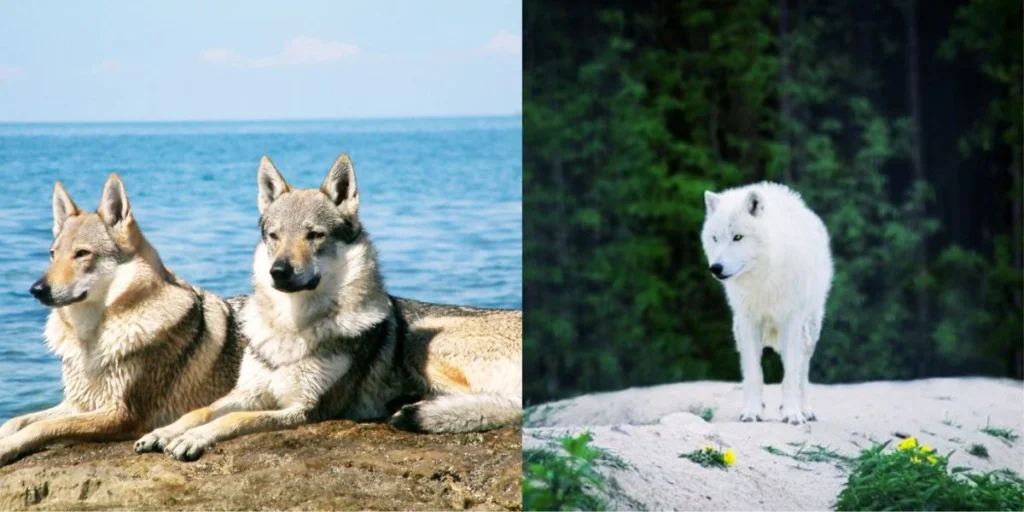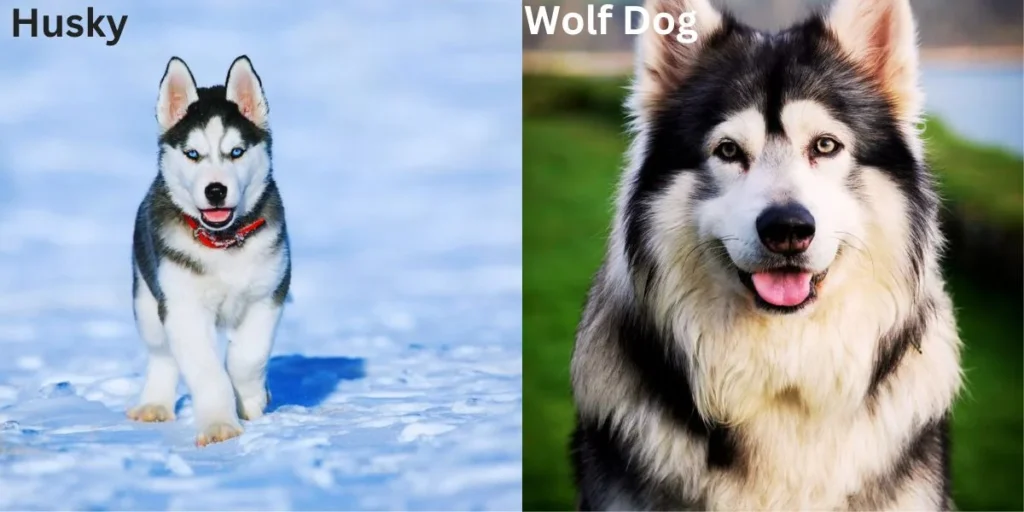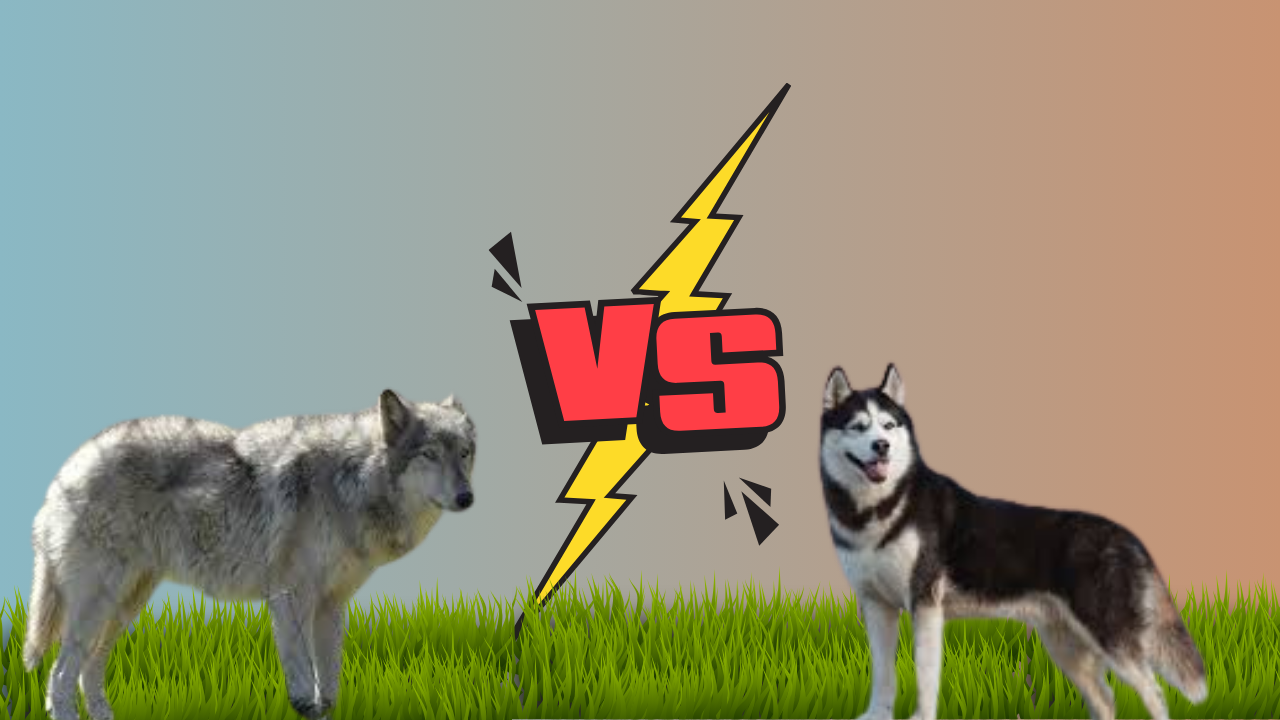Have you ever wondered about the differences in the “husky vs wolf dog” debate? While both are fascinating canines, they represent two worlds: one domesticated for over 3,000 years and the other carrying wild wolf DNA. Did you know that a husky typically weighs around 50 pounds, while a wolf dog can range up to 120 pounds?
Choosing between these two animals isn’t just about their looks; it’s also about their nature and needs. Huskies are known for their playful personalities, but wolf dogs require careful handling due to their 60-70% wild ancestry. Let’s explore what sets them apart!
TABLE OF CONTENTS
Are Wolf Dogs legal to own?

Wolf Dog ownership legality varies significantly across regions. In many places, strict regulations or outright bans exist due to safety concerns and the challenges associated with managing their wild instincts.
For example, some states in the U.S. classify Wolf Dogs as exotic animals, requiring special permits, while others prohibit their ownership entirely. Even where legal, insurance companies may refuse coverage for homes with Wolf Dogs.
Additionally, breeders often face scrutiny to ensure compliance with local laws. It’s crucial to thoroughly research and understand the regulations in your area before adopting a Wolf Dog to avoid legal complications and ensure responsible ownership.
Husky vs Wolf Dog Differences

Origins And Ancestry
Understanding the roots of Huskies and Wolf Dogs helps clarify their unique traits. Let’s dive into where these fascinating canines come from.
Huskies: Born To Pull Sleds In The Arctic
Huskies, originally bred 3,000 years ago, hail from Siberia. The Chukchi people used them for sledding across icy terrains and as companions. With their history, they thrived in harsh climates, working as a team to pull loads over 60 miles per day!
Wolf Dogs: A Wild-Hearted Hybrid
Wolf Dogs are hybrids of wolves and domestic dogs, with records of their existence dating back 12,000 years. These hybrids are about 60% wolf by nature, depending on the generation. They embody a mix of wild instincts and domestic qualities, making them truly unique yet unpredictable pets.
Physical Characteristics
Understanding the physical differences between Huskies and Wolf Dogs helps us see how unique they are.
Size And Build
Huskies are compact, standing 20–23.5 inches tall and weighing around 35–60 pounds. In comparison, Wolf Dogs can grow larger, often exceeding 70 pounds depending on their wolf ancestry. Their size makes Wolf Dogs look more imposing.
Coat And Coloration
Huskies have a thick double coat that keeps them warm even in -50°F conditions. Their coats come in vibrant patterns—think black, gray, white, and even red. Wolf Dogs often have muted, uniform tones that mirror their wild lineage.
Facial Features
A Husky’s almond-shaped eyes, which are often bright blue or heterochromatic, give them a friendly vibe. Wolf Dogs, on the other hand, sport intense amber or yellow eyes and a more predatory stare. Their wolf-like snouts also set them apart. Learn how Italian Greyhounds differ from Whippets in our article Italian Greyhound vs Whippet Dog.
Behavioral Traits: Temperament And Trainability
Understanding how Huskies and Wolf Dogs behave can help you decide which is right for you. Let’s explore their unique temperaments and training challenges.
Temperament: Friendly Versus Wild
Huskies are social butterflies, known for their friendliness and playful energy. They’re perfect for families, as they typically get along well with kids and other pets. Wolf Dogs, however, are unpredictable; only 10% of owners report them as consistently friendly.
Trainability: A Tale Of Patience
Huskies are clever but stubborn, needing consistent training to behave well. About 70% of Husky owners recommend professional help for obedience training. Wolf Dogs? Their mix of wild instincts and domestic traits makes training even tougher—success rates hover around 30%.
Socialization: Complex Dynamics
Huskies thrive in groups and enjoy making new friends, both human and canine. Wolf Dogs, on the other hand, can be wary, with only 40% adjusting to social environments smoothly. Their instincts often clash with domestic life, requiring careful supervision.
Legal And Ethical Considerations
Owning a Husky or a Wolf Dog isn’t just about their adorable looks. It’s crucial to understand the laws and responsibilities tied to them.
Ownership Laws
Did you know that owning a Wolf Dog is restricted or banned in more than 40 U.S. states? Even in states where it’s legal, you might need a special permit, which can cost up to $500 annually. Huskies, on the other hand, face no such legal hurdles.
Ethical Implications
Breeding Wolf Dogs raises ethical questions about their welfare. Only about 10% of these hybrids are suited for domestic life, leaving many abandoned or mistreated. It’s heartbreaking to know that their survival often depends on specialized rescues.
Care Requirements: Tailoring Their Needs
Understanding the care requirements of Huskies and Wolf Dogs is crucial. Their needs differ significantly due to their unique backgrounds. Let’s dive into their diets, exercise needs, and housing preferences to help you decide which is right for you.
Diet: Fueling Their Energetic Lifestyles
Huskies need about 1,200 calories daily, packed with protein and healthy fats to support their energy levels. They’re fine with high-quality dog food, but it should meet their active lifestyle. Wolf Dogs often require a raw diet, with at least 70% meat, to mimic what their wild ancestors would eat.
Exercise: Meeting Their High Energy Demands
Huskies are energetic dogs needing at least 2 hours of exercise daily, like walks, runs, or games. They love pulling sleds or playing fetch, which keeps them happy and healthy. Wolf Dogs demand even more activity, often requiring 3+ hours in secure areas to release their pent-up energy.
Housing: Providing the Right Environment
Huskies adapt well to homes with secure yards, as they’re known escape artists. Their thick coats make them love colder climates, too. Wolf Dogs need large, reinforced enclosures with 8-foot-high fences, as they retain wild instincts and need extra security to thrive. Explore the fascinating comparison of Pitbull Dog vs Staffy in our detailed guide.
Health Concerns
When it comes to health, Huskies and Wolf Dogs face unique challenges. Let’s explore what to expect and how to care for them better.
Huskies: Genetic But Manageable Issues
Huskies are generally healthy but prone to certain conditions. Around 15% may experience hip dysplasia, and about 10% face eye issues like cataracts. Routine vet visits and a good diet go a long way in keeping them fit.
Wolf Dogs: Unpredictable Health Risks
Wolf Dogs can inherit issues from both wolves and dogs. Roughly 20% may develop skeletal problems, and behavioral stress can impact their overall health. These hybrids need a unique care approach, blending wild and domestic requirements.
Vet Care and Monitoring
Both breeds need regular vet check-ups, but Wolf Dogs might require specialized care. About 30% of Wolf Dog owners report needing exotic animal vets. Always plan ahead to ensure their health is well-maintained.
Behavior Around Humans and Pets
Understanding how these animals behave with people and other pets is crucial before deciding which fits your lifestyle. Let’s break down their social habits and instincts.
Huskies: Social Butterflies
Huskies love being around people and other dogs. They score 9/10 in sociability, making them great companions. With early training, they easily adapt to families, including kids and other pets.
Wolf Dogs: Independent and Reserved
Wolf Dogs are more reserved, often scoring about 5/10 in sociability. They can be shy or aloof due to their wolf lineage, making them less predictable. They might not easily bond with strangers or small pets.
Prey Drive: Instincts at Play
Huskies have a moderate prey drive, meaning they might chase small animals but can learn to coexist. Wolf Dogs, with a high prey drive, often struggle, and 85% of owners report issues with smaller pets. These instincts demand cautious handling.
Suitability for Families
Huskies are excellent for active families and thrive in dynamic households. Studies show that Wolf Dogs adapt well to only 25% of homes with children. Their wild instincts make them a better choice for experienced, adult-only households. Discover key differences between African Dogs and Hyenas in our article African Dogs vs Hyena.
Cost and Commitment
When considering a pet, understanding the financial and time investment is crucial. Owning a Husky or a Wolf Dog isn’t just about upfront costs it’s a long-term commitment. Let’s break it down together.
Husky: The Moderate Investor
Huskies typically cost between $800 and $2,000 as puppies, depending on their lineage. Monthly expenses, including food, grooming, and vet care, can range from $75 to $150. These dogs need regular exercise and attention, so expect to spend at least 2 hours daily keeping them entertained.
Wolf Dog: The High Roller
Wolf Dogs are significantly more expensive, with initial costs ranging from $1,500 to $5,000. They require specialized care, including raw diets that cost around $100–$200 monthly. Secure enclosures can add thousands to setup expenses, and you’ll need 3–4 hours daily for physical and mental stimulation.
Time and Lifestyle Commitment
Huskies are ideal for active individuals or families who can meet their exercise needs. On the other hand, Wolf Dogs demand expertise, dedication, and a lifestyle suited to their wild instincts. Choosing one is about balancing your budget and how much time you can commit.
Differences In Ownership Suitability
Choosing between a Husky and a Wolf Dog is a big decision, and each comes with unique challenges. Let’s break it down to see which fits better with your lifestyle.
Huskies: The Energetic Family Favorite
Huskies are great if you want an active and friendly companion. They love families and adapt well to group settings, bonding with kids and adults alike. Around 80% of Husky owners rate them as highly sociable with people and pets.
These dogs need about 2 hours of exercise daily and thrive in cold climates. Their cost is moderate expect to spend $1,200 annually on food, grooming, and basic care. Huskies are better for homes with secure yards for their playful, curious nature.
Wolf Dogs: The Exotic But Demanding Hybrid
Wolf Dogs are not your typical pets they’re hybrids requiring specific care and understanding. About 60% of Wolf Dog owners report behavioral challenges, especially with socialization. Their wild instincts make them less predictable than Huskies.
These animals need at least 5,000 square feet of secure outdoor space. Owning one can cost over $3,000 annually, including reinforced housing and a high-protein diet. Wolf Dogs are best for experienced handlers, not casual pet owners.
Wrap Up
If you’re deciding between a Husky or a Wolf Dog, it’s important to know the key differences. Huskies, with their friendly nature, weigh around 50 pounds on average, while Wolf Dogs, often larger, can top 85 pounds. Owning either comes with unique challenges.
I personally think understanding their needs is crucial. Wolf Dogs, for instance, need high-security enclosures and loads of exercise. Huskies are easier for families. So, when it comes to the “husky vs wolf dog” debate, which one suits your lifestyle best?




